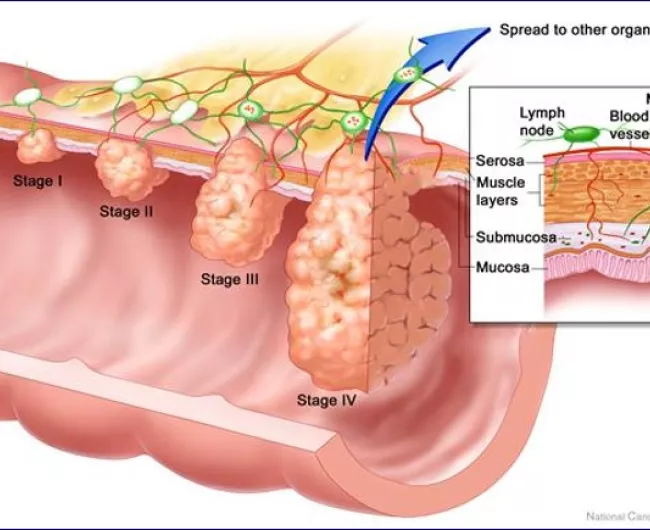
Breaking the Silence on Colon Cancer
What is Colon Cancer?
Colon cancer, also known as colorectal cancer, starts in the large intestine (colon) or the rectum. The colon is part of our digestive system. It helps absorb water and salt from food and stores waste before it leaves the body. When abnormal cells grow uncontrollably in the colon, it becomes cancer. These cancer cells can form tumors and may spread to other parts of the body if not treated early. Colon cancer usually starts as small, non-cancerous growths called polyps that form on the inner walls of the colon. Over time, some of these polyps can turn into cancer if they are not removed.
Signs and Symptoms of Colon Cancer
Colon cancer often develops slowly and may not cause any symptoms in its early stages. However, as the disease progresses, some warning signs may appear. Common symptoms include:
-
Changes in bowel habits, such as diarrhea, constipation, or a feeling that the bowel doesn't empty completely.
-
You may also notice blood in the stool, either bright red or dark-colored.
-
Persistent stomach pain, cramps, bloating, or discomfort can also be a sign.
-
Unexplained weight loss and constant tiredness or weakness are other important symptoms to watch out for.
These symptoms can be caused by many other conditions too, but if they last for more than a few weeks, it's important to consult a doctor. Early detection greatly improves the chances of successful treatment.
Risk Factors for Colon Cancer
Several factors can increase a person's risk of developing colon cancer:
-
Age is one of the biggest risk factors; most cases occur in people over 50.
-
A family history of colon cancer or inherited conditions like Lynch syndrome or familial adenomatous polyposis (FAP) can raise the risk.
-
Lifestyle choices such as eating a diet high in red or processed meats, low fiber intake, lack of physical activity, obesity, smoking, and heavy alcohol use can also contribute.
-
People with conditions like inflammatory bowel disease (Crohn’s disease or ulcerative colitis) are at higher risk too.
Although having one or more risk factors doesn’t mean you’ll definitely get colon cancer, it’s important to be aware and take steps for prevention and regular screening.
How Is Colon Cancer Diagnosed?
Diagnosing colon cancer early can help in treating it more effectively.
-
A colonoscopy is the most accurate test to find colon cancer. A long, flexible tube with a camera is used to see the inside of the colon. Doctors can also remove polyps or take tissue samples (biopsies) during the procedure.
-
Stool tests are simple, non-invasive ways to look for early signs of colon cancer.
-
Imaging tests are used to find out if the cancer has spread. CT scans and MRI scans give detailed pictures of the colon and nearby organs. A PET scan may be used in certain cases to detect cancer in other parts of the body.
-
Biopsy: If a suspicious area is found during a colonoscopy, the doctor will take a small tissue sample called a biopsy. This sample is sent to the lab to check under a microscope for cancer cells. A biopsy is the only way to confirm the diagnosis of colon cancer.
Treatments
-
Surgery: Surgery is the most common treatment, especially in early stages.
-
Polypectomy: Removal of cancerous polyps during a colonoscopy (if cancer is small and localized).
-
Colectomy: Removal of the part of the colon containing the cancer, along with nearby lymph nodes.
-
Partial Colectomy: Only the affected portion is removed.
-
Total Colectomy: Entire colon is removed in some rare or widespread cases.
-
Colostomy: In some cases, the bowel may be diverted through an opening in the abdominal wall.
-
-
Chemotherapy: Chemotherapy uses drugs to kill cancer cells and is usually recommended for:
-
Stage II with high-risk features
-
Stage III colon cancer (spread to lymph nodes)
-
Stage IV colon cancer (spread to other organs)
-
-
Radiation Therapy: Not commonly used for colon cancer unless:
-
Cancer has spread or recurred in a specific area
-
Before surgery to shrink tumors
-
To relieve symptoms like pain or bleeding in advanced cases
-
-
Targeted Therapy: These are drugs that specifically attack cancer cell mechanisms.
-
Immunotherapy: Immunotherapy is a type of cancer treatment that helps the body's own immune system recognize and fight cancer cells more effectively.
Conclusion
Colon cancer is a serious but highly treatable disease, especially when detected early. With proper treatment and follow-up, many people with colon cancer can achieve long-term remission or even be cured. Maintaining a healthy lifestyle, including a balanced diet, regular exercise, avoiding smoking, and limiting alcohol, can help reduce the risk and improve overall health.

0 Comments